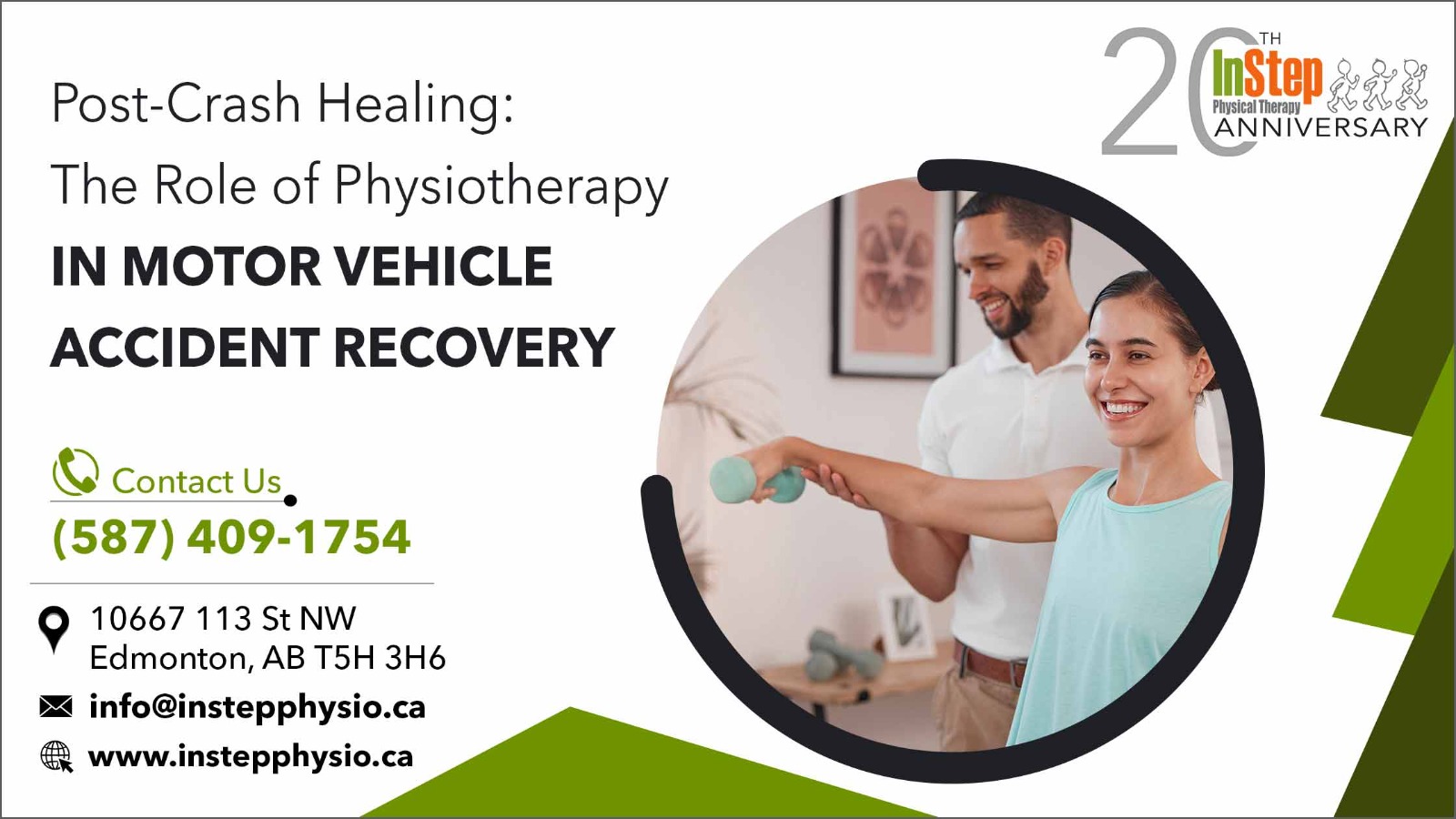Recovery after any motor vehicle accident can be a complex process. It involves not just the healing of physical injuries but also overcoming psychological distress and regaining a sense of normalcy. As part of a multidisciplinary healthcare approach, physiotherapy plays a major role in the journey of motor vehicle accident recovery. In Step Physical Therapy Edmonton is committed to helping patients navigate their post-crash healing journey with professional and compassionate car accident physiotherapy services.
Assessing the Impact of the Accident
The first step in accident physiotherapy involves a comprehensive assessment to understand the full extent of the injuries sustained. Motor vehicle accidents can result in various conditions – from fractures and soft tissue injuries to whiplash and concussion. In Step Physical Therapy’s team of experienced physiotherapists in Edmonton uses diagnostic tools to identify underlying issues and create tailored rehabilitation plans.
Physiotherapeutic Measures: An Integrated Framework
Recovery from motor vehicle accidents through physiotherapy is intricate, seamlessly integrating diverse methods to tackle the various dimensions of injuries and malfunctions.
- Tactile Manipulation: Using their adept hands, physiotherapists conduct joint adjustments and tissue manipulation, aiming to curtail pain, lessen inflammation, and broaden mobility.
- Custom Exercise Plans: Personalized regimens focused on strength and adaptability stand central to post-accident physiotherapy. These routines are pivotal in reviving bodily functions, augmenting movement, and thwarting persistent incapacitation.
- Mastering Pain Alleviation: Therapists enlighten patients about managing discomfort, encompassing methods like thermal therapies, relaxation drills, and the prudent use of non-prescription analgesics.
- Neural Recovery Protocols: In instances where the accident has inflicted neurological detriments, dedicated therapeutic actions are employed to hone motor skills, stability, and synchrony.
- Electromedical Procedures: Techniques like TENS (Transcutaneous Electrical Nerve Stimulation), therapeutic ultrasounds, and photon therapy play a role in hastening recuperation by fostering circulation, tempering inflammatory responses, and assuaging discomfort.
- Dry Needling: This technique uses fine needles to target specific trigger points, helping alleviate muscle pain and spasms. It can be particularly effective for deep-seated pain or tension that’s hard to reach with conventional manual therapy.
- Gait Analysis and Training: For those facing difficulty in walking post-accident, gait analysis can be instrumental. Therapists assess the patient’s walking pattern, identify abnormalities, and then provide targeted training to ensure a normalized gait.
- Vestibular Rehabilitation: Motor vehicle accidents can sometimes lead to dizziness or balance issues. Vestibular rehab aims to treat these symptoms, using exercises and techniques to restore inner ear equilibrium.
- Myofascial Release: This hands-on technique targets fascia, the connective tissue surrounding muscles. It can be beneficial for those experiencing pain or tightness as a result of fascial restrictions.
Navigating the Psychological Impact of Motor Vehicle Accidents
A holistic approach to motor vehicle accident physiotherapy Edmonton recognizes the psychological trauma often associated with such events. Emotional disturbances, including feelings of depression, heightened stress, PTSD, and anxiety, frequently ensue post-accidents. While physiotherapists primarily focus on physical recuperation, their contribution in providing emotional reassurance, comprehending the nexus between mental and physical healing, and guiding patients to apt mental health channels is invaluable.
Physiotherapy: A Crucial Link in Return to Work and Normal Life
Following a motor vehicle accident, one of the primary goals for many patients is to return to their pre-accident lifestyle. Whether it’s returning to work, sports, or daily activities, physiotherapy is a crucial link in this process. At its core, it is about restoring function. This means enabling patients to perform daily activities – whether it’s household chores, recreational pursuits, or professional tasks – without discomfort or restriction. Through goal setting, postural education, ergonomic adjustments, balance training, gradual loading, work simulation activities, and sport-specific training, physiotherapists support patients in resuming their regular routines safely and efficiently.
The Importance of Early Intervention
Initiating physiotherapy soon after a motor vehicle accident can significantly influence recovery outcomes. Early intervention could help minimize the impact of injuries, prevent the development of chronic pain, and expedite the return to normal life. It’s essential to seek professional help even when injuries seem minor since some conditions may not manifest immediately after the accident.
Chronic Pain and Long-term Implications
Unfortunately, for some, pain and dysfunction after a motor vehicle accident can persist, leading to chronic issues. Recognizing these possibilities, physiotherapy focuses not just on immediate recovery but also on strategies to manage and prevent long-term complications. Through techniques such as neural mobilizations, exercise therapy, and ergonomic advice, physiotherapists equip patients to manage potential long-term effects.
Conclusion
Motor vehicle accidents can disrupt lives, but with the right support and professional care, recovery is within reach. Physiotherapy, with its focus on restoring function, managing pain, and promoting independence, plays a critical role in the healing journey. At InStep Physical Therapy Edmonton, we offer comprehensive accident physiotherapy services, helping individuals reclaim their health and get back to the lives they love. Reach out to us today to begin your journey to recovery.
